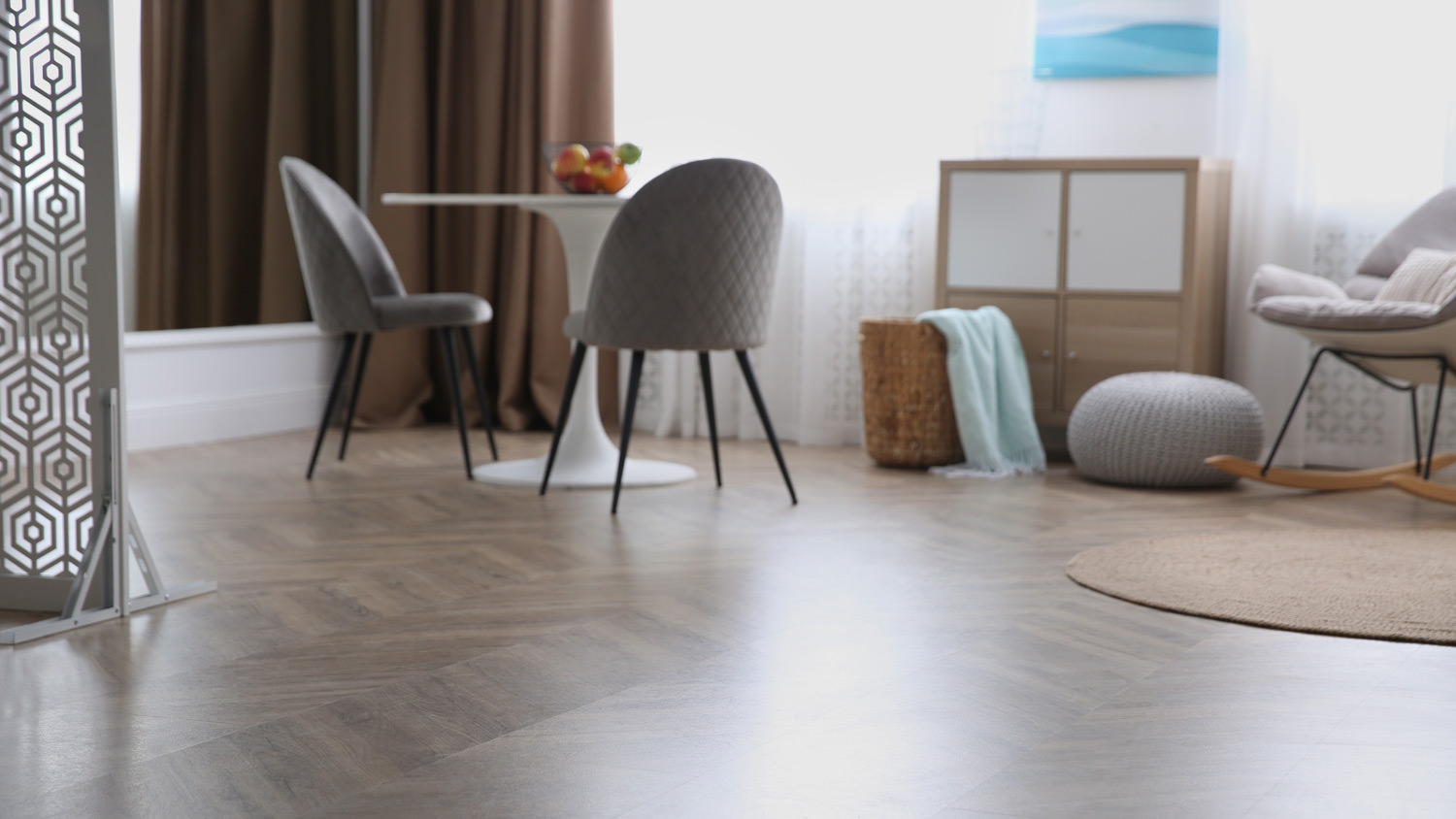
Find out the average vinyl floor repair cost, key price factors, and ways to save. Get accurate estimates to plan your vinyl floor repair project.
Flooring costs depend on your project and location. Check with a local pro for your specific job.
The biggest natural stone flooring cost factors are the type of stone, labor, and the size of the covered area.
Material costs range from $4 to $18+ per square foot, depending on the type of stone you choose.
Professional installation costs $5 to $15+ per square foot and ensures a lasting, high-quality finish, while regular sealing protects your investment.
Natural stone flooring can boost your home’s value, offering a return on investment (ROI) of 55% to 70%.
This article was created using automation technology and thoroughly fact-checked and edited by an Angi Editor in accordance with our AI policy.
Natural stone flooring costs average $915 to $3,089 for a typical home, with most homeowners spending $10 to $35 per square foot installed. The final price depends on the type of stone, room size, and installation complexity. Premium stones and intricate layouts can push costs higher, while basic options are more budget-friendly.
Professional labor rates for stone flooring installation range from $5 to $15+ per square foot, and material costs vary widely depending on your chosen stone.

Several factors affect the total cost of installing natural stone flooring, from labor rates to project complexity.
The size of your natural stone flooring project is one of the most important cost drivers. Larger spaces require more material and labor, which increases your total investment. Many suppliers and installers also have minimum project size requirements, so even small rooms may have a baseline cost.
Typical room sizes, such as kitchens, bathrooms, and living rooms, can have very different cost implications. Installing stone in a single room is usually less expensive overall than doing an entire home, but the cost per square foot may be slightly higher for smaller jobs due to minimum charges.
Natural stone flooring is often priced by the square foot. Material costs range from $4 to $18+ per square foot, and installation adds another $5 to $15+ per square foot. To estimate your total project cost, multiply the total square footage by the combined material and installation rate. For example, a 100-square-foot room at $20 per square foot would cost an average of $2,000 installed.
| Room/Area | Square Footage | Average Cost |
|---|---|---|
| Bathroom | 40 | $360–$1,320 |
| Kitchen | 120 | $1,000–$4,000 |
| Living room | 250 | $2,250–$8,250 |
| Whole house | 1,000 | $9,000–$33,000 |
When planning your project, always budget for extra material. Cuts, breakage, and pattern matching mean you will need more stone than your room’s actual square footage. Most pros recommend ordering 10% to 15% extra to cover these overages, ensuring you have enough matching material for repairs or future replacements.
The type of stone you choose has a major impact on both material and installation costs. Each stone offers its own look, durability, and price point. Popular options include marble, granite, travertine, slate, limestone, sandstone, and quartzite.
| Stone Type | Material Cost per Sq. Ft. | Installed Cost per Sq. Ft. | Pros | Cons |
|---|---|---|---|---|
| Marble | $6–$18 | $14–$30 | Elegant, luxurious, unique veining | Prone to scratching, requires sealing |
| Granite | $5–$12 | $12–$25 | Extremely durable, heat-resistant | Heavy, limited color options |
| Travertine | $4–$8 | $10–$18 | Soft, warm tones, affordable | Porous, needs frequent sealing |
| Slate | $5–$10 | $10–$22 | Slip-resistant, durable | Uneven texture, can chip |
| Limestone | $5–$11 | $12–$24 | Subtle, natural look | Softer, stains easily |
| Sandstone | $4–$9 | $10–$20 | Earthy colors, unique patterns | Abrasive surface, porous |
| Quartzite | $8–$16 | $14–$32 | Extremely hard, low maintenance | Expensive, limited supply |
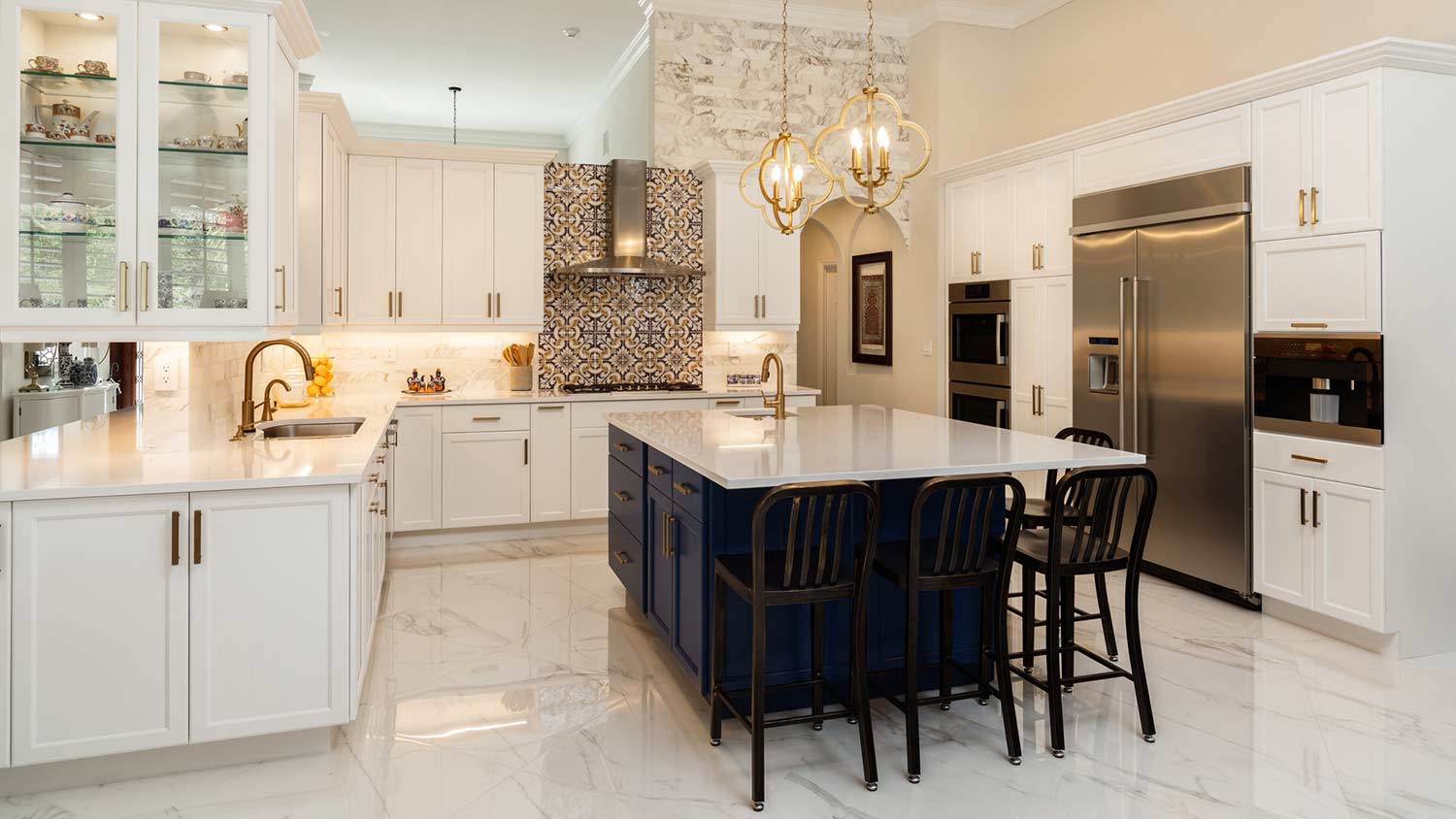
Higher stone grades, premium finishes (like polished or honed), and thicker tiles all increase your total cost. Standard-grade stone with a basic finish is more affordable, while top-tier materials with custom finishes or extra thickness command premium prices. For many homeowners, a mid-grade stone balances appearance, durability, and budget.
Large-format tiles, mosaics, or custom shapes often cost more per square foot due to extra labor and higher material waste. Intricate patterns such as herringbone, borders, or inlays require additional cutting and expert installation, which increases both time and cost.
Imported stones or rare colors are often more expensive due to shipping and limited availability. Domestic stones can be more affordable and have shorter lead times. If your project requires a special order or custom cut, expect to pay more and wait longer for delivery.

Where you live and where you install the stone in your home both affect your total project cost. Natural stone flooring costs vary significantly by region. Urban areas and regions with a high cost of living tend to have higher material and labor rates. Transportation costs for heavy stone materials also impact pricing, especially if you are far from a supplier.
Installing natural stone flooring in kitchens, bathrooms, or entryways may cost more than in bedrooms or living rooms due to additional waterproofing, underlayment, or complex layouts. Moisture-prone or high-traffic areas often require extra sealing or thicker stone, which increases costs.
Professional installation is essential for natural stone flooring. Flooring contractors, tile setters, or stone specialists charge $5 to $15 per square foot, or $50 to $150 per hour, depending on experience and region. Some installers have minimum service fees or project minimums, which can affect smaller jobs. Labor costs are higher in unionized or high-demand areas and for projects with complex patterns or difficult site access.
Permits may be required for natural stone flooring installation if structural changes, electrical work (such as radiant heating), or significant demolition are involved. Permit costs vary by city and project scope, ranging from $50 to $300. Contractors often handle permits, but always confirm this before starting your project.
Adding radiant heat under your stone flooring increases comfort, but adds $10 to $20 per square foot. Custom inlays, medallions, stair treads, or special transitions will increase both material and labor costs. Upgrades like soundproofing or premium underlayment also add to your final total.
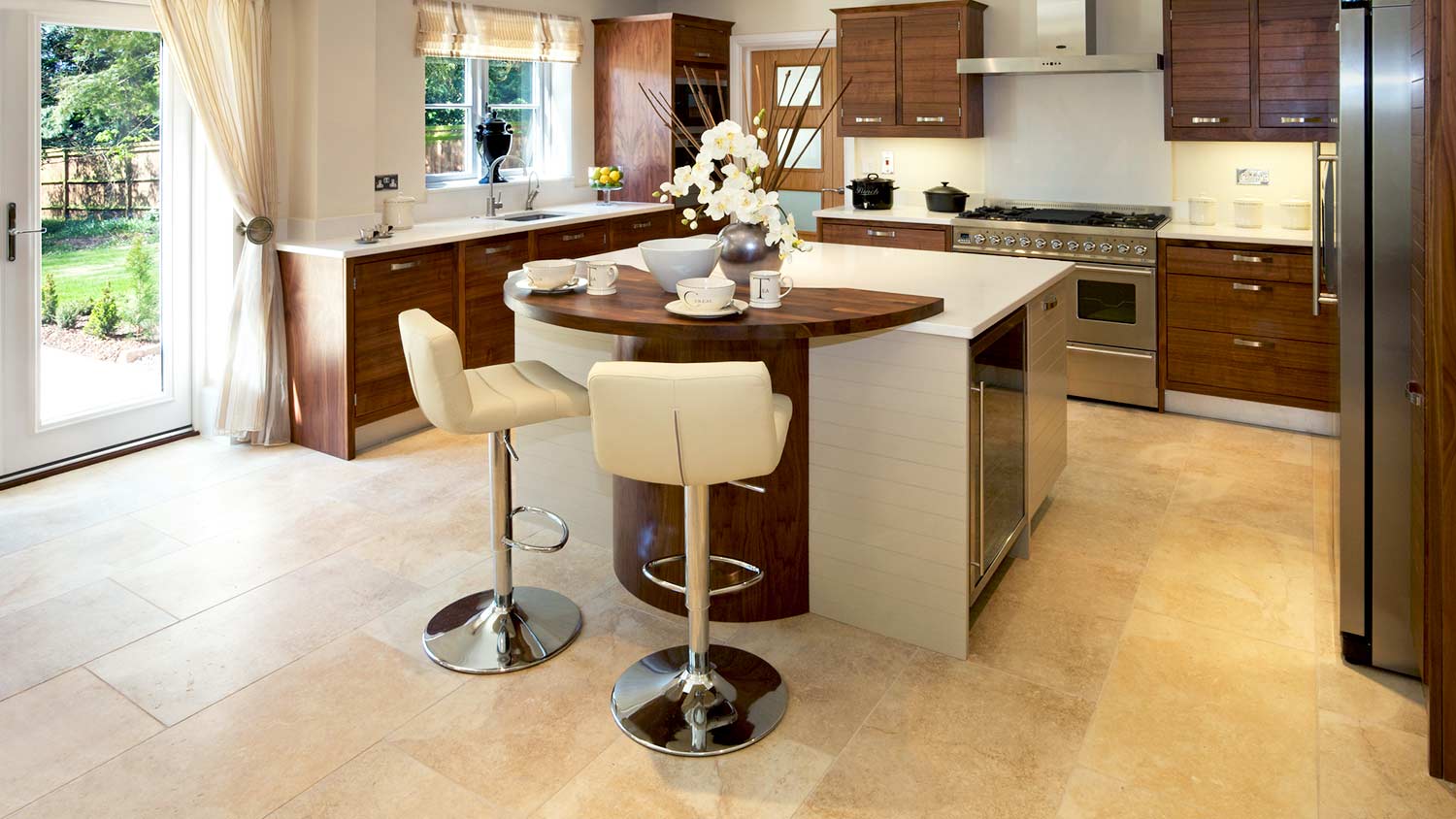
Complex room layouts, multiple rooms, or intricate designs increase labor and waste.
Multi-story homes, tight spaces, or limited site access can raise delivery and installation costs.
Preparing the site, including subfloor replacement or leveling, moisture barriers, and old flooring removal, adds to your project budget.
Delivery fees for heavy stone, post-installation cleanup, and debris removal are often extra.
Custom designs or professional consultation services may add design fees.
Some municipalities require inspection fees, especially if radiant heat is involved.
Beyond the upfront installation, several ongoing and one-time costs can affect your total investment.
Most stone manufacturers offer warranties on material defects, while installers provide workmanship guarantees—typically for one to five years. Extended warranties are available for an extra fee, but always check what’s covered, such as cracking or installation issues, and what is excluded (like staining or wear from neglect).
If you opt for radiant heating under your stone flooring, expect a modest increase in energy costs. Stone’s thermal mass can help retain heat, sometimes lowering heating bills in colder climates.
Routine cleaning is important for stone flooring, using pH-neutral cleaners and soft mops. Sealing is required every one to three years, costing $1 to $3 per square foot per application. Professional deep cleaning or resealing services might cost $200 to $600 per visit. On average, plan to spend $100 to $400 per year on maintenance.
Sales tax applies to both materials and installation services in many states, ranging from 4% to 10%. Additional local taxes may apply to home improvement projects.
Natural stone flooring does not usually affect your homeowners' insurance premium, but it’s wise to update your policy after a major renovation. Some policies offer coverage for accidental damage or water issues, but you may need an additional rider for full protection.
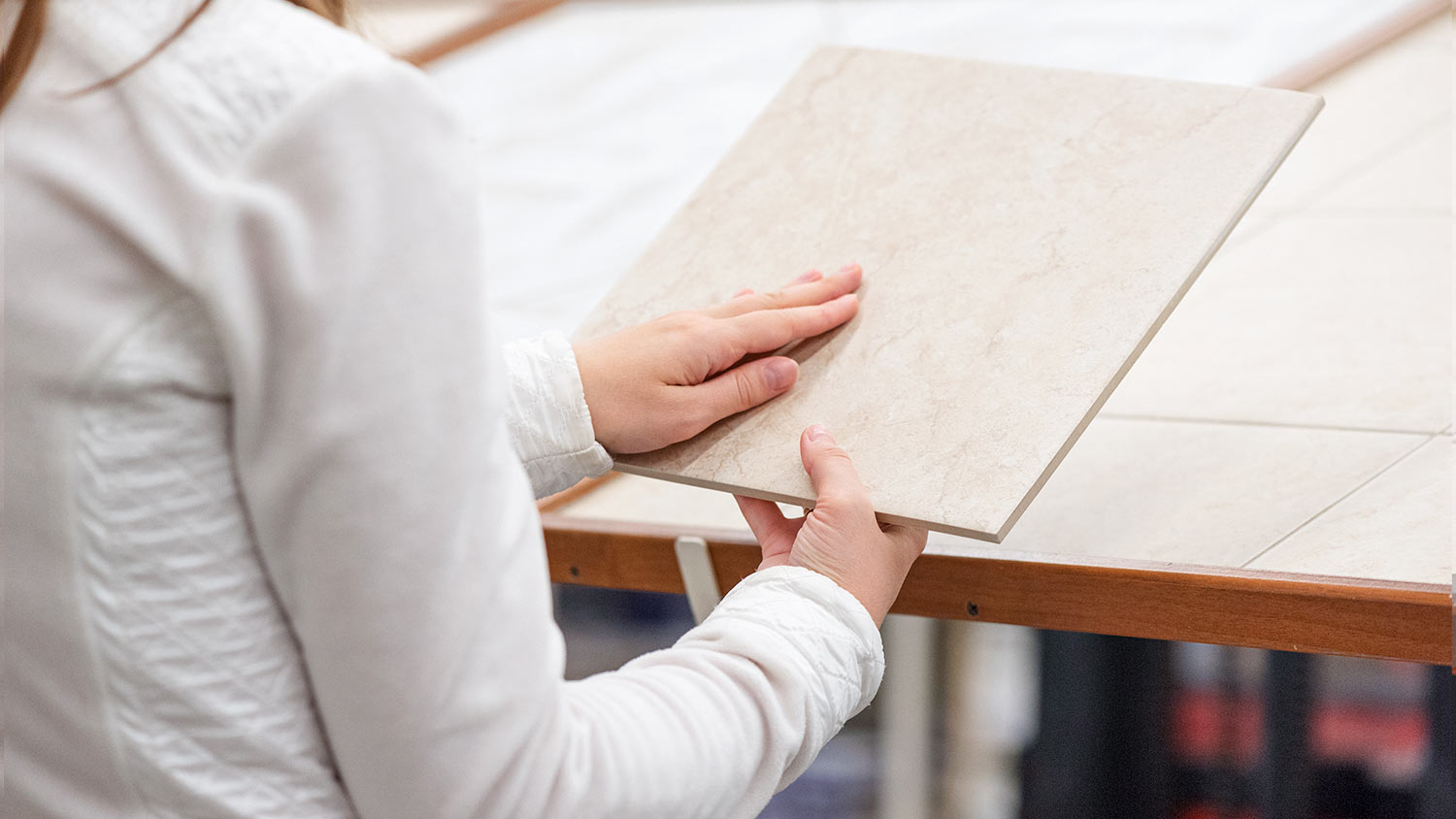
Some homeowners consider installing natural stone flooring themselves to save on labor, but this choice comes with added risks and responsibilities.
DIYers pay retail prices for stone, which may be higher than contractor rates. You’ll need to rent or buy tools like a wet saw, spacers, trowels, and safety gear, which can add $200 to $800 to your budget. Installation requires careful planning, precision, and physical effort—expect to spend several days per room. Mistakes can result in wasted material and uneven floors.
By handling installation yourself, you can save on labor costs, which can amount to several thousand dollars on a large project. However, improper installation can lead to cracking, loose tiles, or poor adhesion, resulting in expensive repairs later. If the finished result is subpar, you may need to pay a pro to redo the work.
Professional installers bring expertise, speed, and warranty coverage. While hiring a pro increases your upfront cost, it ensures a durable, high-quality result and peace of mind.
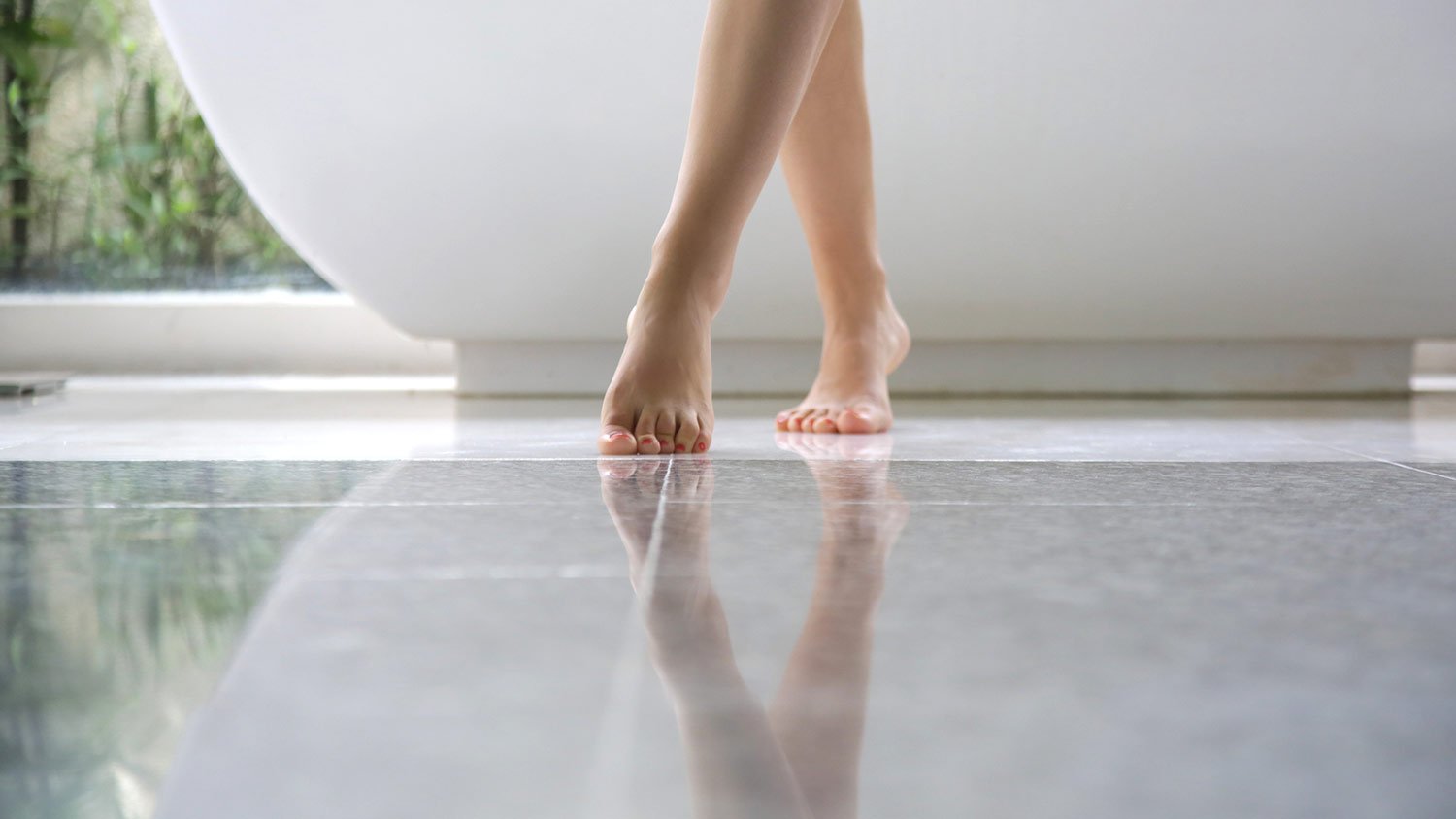
Knowing when to repair or replace your stone flooring can help you make the most cost-effective decision.
Stone repair is possible for chipped, cracked, or loose tiles if the damage is limited. Full replacement is best for widespread damage, significant subfloor issues, or if the style is outdated. Age and warranty status also play a role—older floors or those out of warranty may be better candidates for replacement.
Repairing natural stone floors costs $10 to $30 per square foot or $50 to $300 per tile, depending on the extent of the damage. If repair costs approach or exceed 50% of the price to replace the floor, replacement is usually the better long-term value.
Repairs involve removing damaged tiles, preparing the subfloor, and installing matching replacements. Matching stone type, color, and finish is crucial for seamless repairs, which is why many homeowners keep extra tiles from the original installation.
Installing natural stone flooring is an investment that can boost your home’s value and appeal.
Natural stone flooring offers an average ROI of 55% to 70%. Its durability and timeless beauty are attractive to buyers, helping your home stand out in competitive markets.
Compared to hardwood, laminate, ceramic tile, or luxury vinyl, natural stone often delivers a higher ROI in upscale or luxury homes. However, ROI depends on your location, home value, and local buyer preferences.
Natural stone flooring provides more than just financial benefits. It offers slip resistance (with the right finish), reduces allergens, and is compatible with radiant heating. Its durability makes it suitable for high-traffic areas, and it can last a lifetime with proper care. Stone’s natural beauty and customization options add a unique, upscale look to any space.
Consider these cost-saving strategies to make your natural stone flooring project more budget-friendly:
Buy materials during sales or from local suppliers to reduce shipping costs.
Choose standard tile sizes and patterns to minimize labor and waste.
Limit custom features or intricate layouts to high-visibility areas only.
Remove old flooring yourself to save on demolition costs.
Get multiple quotes from reputable local stone flooring installers for competitive pricing.
Regular cleaning and sealing to extend the life of your flooring and avoid costly repairs.
Home is the most important place on earth, which is why Angi has helped more than 150 million homeowners transform their houses into homes they adore. To help homeowners with their next project, Angi provides readers with the most accurate cost data and upholds strict editorial standards. We extensively research project costs to develop the pricing data you see, so you can make the best decisions for you and your home. We rely on reputable sources, including the U.S. Bureau of Labor Statistics, academic journals, market studies, and interviews with industry experts—all to ensure our prices reflect real-world projects.
Want to help us improve our cost data? Send us a recent project quote to [email protected]. Quotes and personal information will not be shared publicly.
From average costs to expert advice, get all the answers you need to get your job done.

Find out the average vinyl floor repair cost, key price factors, and ways to save. Get accurate estimates to plan your vinyl floor repair project.

Staining concrete floors can add a little something to a drab slab. Learn more about how much stained concrete floors cost and what factors impact it.
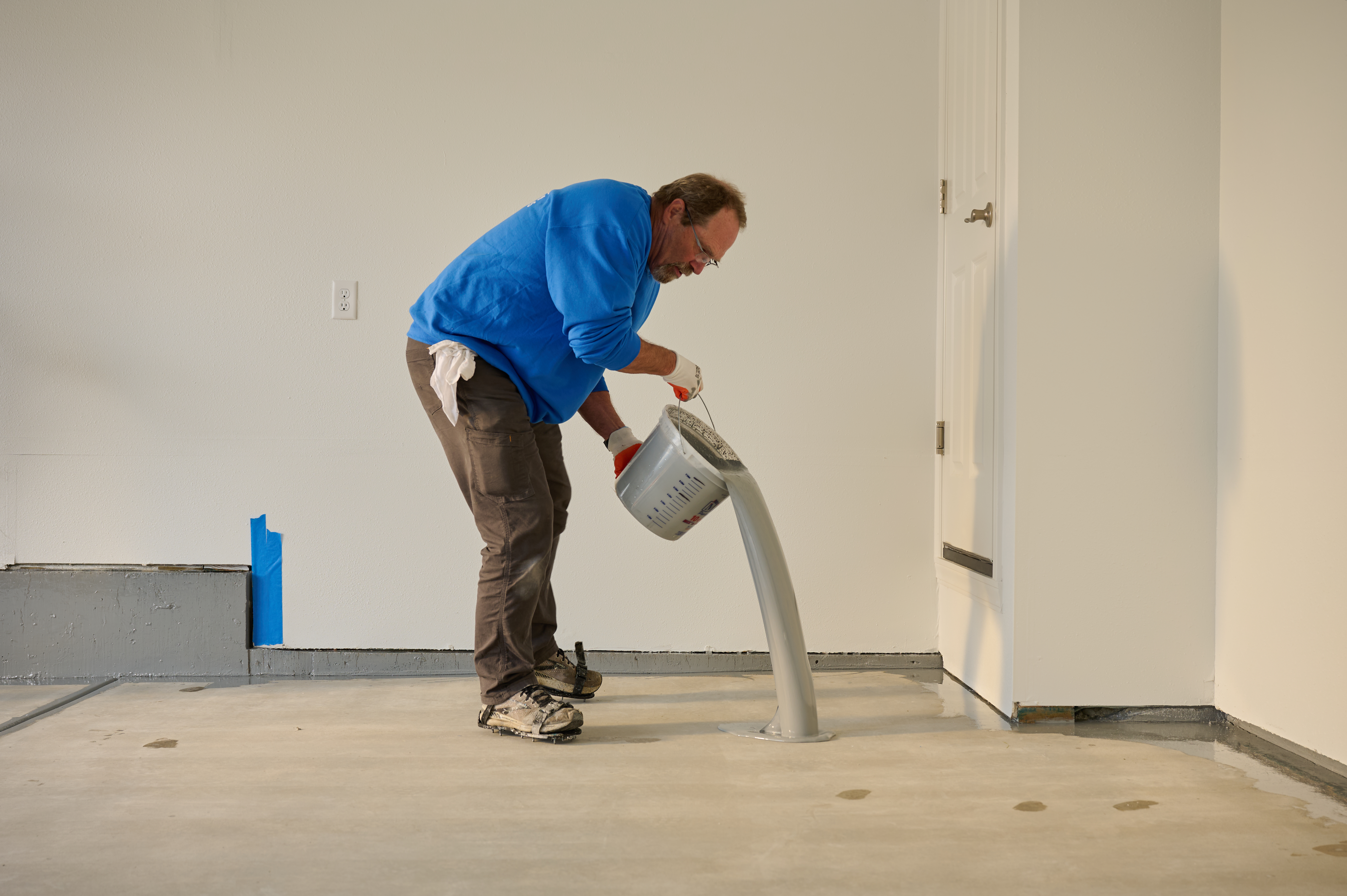
Pouring a new concrete floor can create new usable space for your home and raise its value. This guide breaks down what affects project costs.

Looking for some durable yet stylish entryway and mudroom flooring options? Check out our list of some of the best types here.

Updated flooring can make any room in your home feel brand new. Explore flooring installation costs in Dallas, TX, from materials to labor costs.

Did you find a problem with your laminate flooring? Read this guide to learn about common laminate flooring issues and how to fix them.